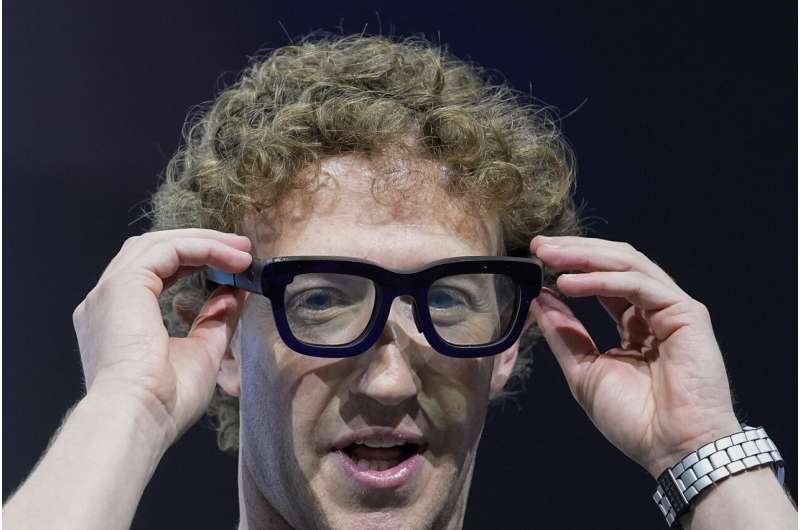On Wednesday, Meta showcased updates to its virtual reality headset and Ray-Ban smart glasses, highlighting its advancements in artificial intelligence and the evolution of computing platforms beyond traditional smartphones and computers.
CEO Mark Zuckerberg introduced Orion, which he described as “the most advanced glasses the world has ever seen.” He acknowledged the significant technical challenges involved in creating these holographic augmented reality glasses, emphasizing that they needed to be lightweight and wire-free, weighing under 100 grams (3.5 ounces). Besides standard interaction methods like voice and hand gestures, Orion features a “wrist-based neural interface,” enabling users to send signals from their brain to the device via a wristband that converts nerve signals into digital commands.
Currently, there is no release date for Orion, with Zuckerberg referring to it as a “glimpse of the future.”
Zuckerberg, energized by the audience of developers and journalists at Meta’s Menlo Park, California, headquarters, stated that the company aims to “bring the future to everyone” through its headsets, glasses, and AI system. As part of an update to its Llama model, users will now be able to interact with Meta AI through voice, featuring celebrity voices from figures like John Cena, Judi Dench, and Awkwafina. “We are trying to build a future that is more open, more accessible, more natural, and more about human connection,” he declared, noting that this vision reflects the core values Meta has embraced throughout its 20-year history.
An AI feature designed for influencers allows them to create AI replicas of themselves to engage with fans. During the keynote, an AI version of creator Don Allen Stevenson III responded to questions just as the real person would, showcasing the technology’s capabilities. When asked about cattle ranching, the AI replied, “My expertise lies in technology and design, not agriculture.”
Zuckerberg also demonstrated real-time translation during a conversation with Mexican mixed martial artist Brandon Moreno, where he spoke in English and Moreno replied in Spanish, with the translation occurring instantaneously. Users can even dub their videos in another language, making it appear as though they are speaking natively by synchronizing lip movements.
Meta AI now boasts 500 million users, a figure that Jeremy Goldman of the research firm Emarketer deemed “jaw-dropping.” He commented, “Meta has transformed from just a social media company into an AI powerhouse. Zuckerberg’s use of celebrity voices is not just for entertainment; it directly challenges OpenAI by emphasizing real-world utility.”
In addition to introducing the Quest 3 last year, Meta announced a more affordable version of the VR headset, the 3S, priced at $299, compared to the $499 standard Quest 3. The S3 will start shipping on October 15. Goldman observed that Meta is “aggressively undercutting Apple’s Vision Pro to dominate the mid-tier AR/VR market,” noting that Apple’s headset retails for $3,500.
While VR headsets have generated significant attention, the augmented reality Ray-Ban smart glasses have emerged as a surprising success for Meta. Although the company has not disclosed specific sales figures, Zuckerberg mentioned during Meta’s July earnings call that the glasses have exceeded expectations, largely due to AI enhancements. On Wednesday, he reported that Meta has resolved earlier supply issues related to high demand for the Ray-Bans.
Zuckerberg highlighted the glasses’ compatibility with AI, stating, “They are kind of the perfect form factor for AI.” He illustrated their utility by explaining that users could ask the glasses to remind them where they parked, suggest smoothie recipes based on a selection of fruits, or help them choose a party outfit.
Despite rebranding from Facebook to Meta in 2021, the company still derives nearly all its revenue from advertising. In its most recent quarter, 98% of its over $39 billion in revenue came from ads. At the same time, Meta is investing heavily in AI and what Zuckerberg perceives as the future of computing through VR headsets and AR glasses.
Forrester research director Mike Proulx expressed skepticism about the mainstream adoption of VR headsets, citing their cumbersome nature and the limited tolerance users have for prolonged use. In contrast, he noted that smart glasses can integrate computing power into a familiar form factor, potentially transforming consumer interactions with brands as the technology evolves.
Proulx concluded that the Orion prototype “sets the stage for a future where a revolutionary 3D computing platform is within reach and can actually be useful to the everyday consumer.”
